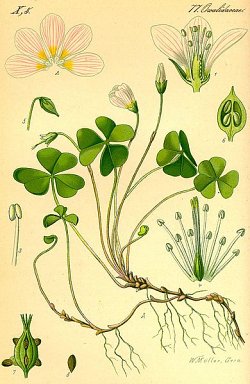 I spotted a little patch of wood-sorrel in the woods while out walking the dog the other day – at first I thought it was clover but then I noticed the flowers were very different and a quick swizz in my wild flowers book positively identified it was wood-sorrel.
I spotted a little patch of wood-sorrel in the woods while out walking the dog the other day – at first I thought it was clover but then I noticed the flowers were very different and a quick swizz in my wild flowers book positively identified it was wood-sorrel.
People have apparently eaten wood-sorrel for thousands of years – as both a food and for medicinal purposes. As there only seemed to be a small patch of it, we didn’t want to take too much – enough for a full salad or whatever – but tried a few leaves each.
At first, it didn’t seem to have any flavour at all but it quickly built up. I’d make the mistake of having something strong flavoured (a lemon-flavoured Nufofen Meltlet) before I left the house so I didn’t get an accurate picture of it but it was a little bitter, quite green* with a slightly spicy/peppery after taste. John said he thought there was a hint of lemoniness – not the whole time but just when he first bit into the leaf. Other people have described it as sour and I thought this might fit with John’s lemoniness but he said that wasn’t the case – it was nice lemon without the offputting sour. Apparently the dried leaves of common wood-sorrel can make a lemony-tasting tea so John isn’t lying – I’ll have to try it again when I’ve not got fake lemon in my mouth already.
* Between ourselves, John & I often describe things as tasting “green” – for example, salad is sometimes too green tasting and the wild garlic pesto we made a few years ago using older/post-flower wild garlic leaves was far too green – but we’ve never been able to accurately describe what “green” is, other than it being a bit bitter. Anyway, reading about wood-sorrel & the Oxalis genus, I’ve ended up reading a lot about oxalic acid too and I wonder if this is what our “green” is. Oxalic acid is found in a lot of green leafy edibles from lettuce to spinach & broccoli but is toxic to humans if they eat too much of it – it’s highly concentrated in rhubarb leaves and is what makes them poisonous to us – but is said to be “generally of little or no consequence” to people with a normal balanced diet & regular kidney function. Oxalic acid apparently tastes a little sour, which isn’t a million miles from our “bit bitter” description.
